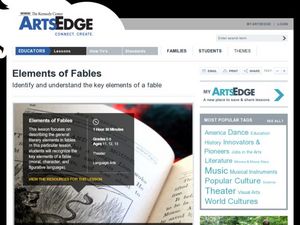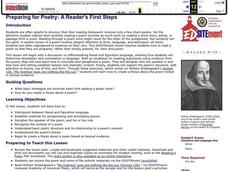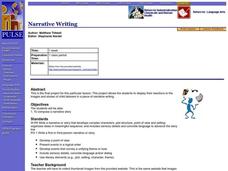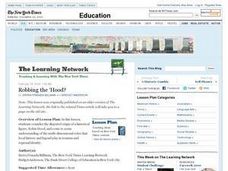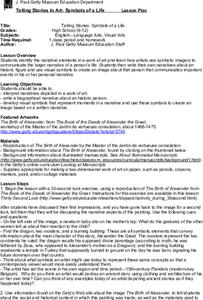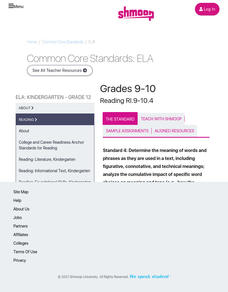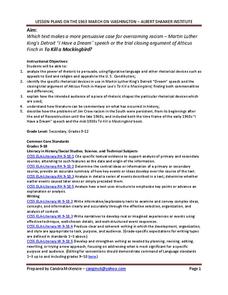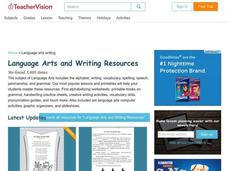Curated OER
Elements of Fables
Students explore the attributes of fables. In this literature lesson, students read several fables and identify the moral lesson, characterization, and figurative language in each. Students then retell their favorite fables in their own...
Manchester University
Alliteration
Kids create cool clauses selecting a single starting sound. Ah, alliteration.
Curated OER
Preparing for Poetry: A Reader's First Steps
Learners examine denotation and connotation in language, and paraphrase a poem. They read and analyze a sonnet by iam Shakespeare, analyze the attitude and tone, paraphrase a poem, and create a thesis about a poem based on textual evidence.
Curated OER
Hamilton and Burr : Compare and Contrast
Who were Aaron Burr and Alexander Hamilton? High schoolers examine the character traits of these historical figures and watch the video, The Duel. Hamilton vs. Burr: An Event that Changed History (available from PBS), to gain an...
Curated OER
Using Descriptive Language
Students explore the technique of descriptive writing. As a class, they observe a poster and describe it using adjectives. They discuss how descriptive words can be used literally and figuratively in the world of advertising. After...
Curated OER
Visual Puns - Paper Mache Sculpture
Explore the pop art movement and create a sculpture in the pop art style based on a visual pun, or play on words. The scholar's work may use humor, allegory, metaphor, or be in the form of a parody. Visual examples are provided, and some...
Curated OER
Two Sides, Same Coin: How Political Beliefs Influence Language Use
Learners read several magazine articles on the same topic written from different political perspectives, paying particular attention to the diction, syntax, and arguments presented in support the point of view expressed. They then select...
Curated OER
Narrative Nuts and Bolts
After viewing slides and reading about child labor, young authors compose an original narrative story. They practice note-taking skills and work to effectively engage a reader by incorporating plot, logical order, complex characters,...
Curated OER
Narrative Writing
Imagine a day in the life of a child who has to work 12-14 hours a day, seven days a week. After viewing images and reading stories of child laborers, class members select an image and write a richly detailed narrative about a typical...
Curated OER
Looking at Portraits: Literary Monuments
Examine artwork, research literature, and create art pieces for a monument to a literary figure. Young scholars analyze the sculpture Model for a Monument to Alexandre Dumas père and compare it to other well-known monuments. They...
Curated OER
Poetry Through Digital Storytelling
Bring digital storytelling to your language arts class! To begin, learners select their own topic, such as a poem that reflects a life experience they had or a historical figure who interests them. Then they work to create a storyboard...
Curated OER
Robbing the 'Hood?
Young scholars investigate historical figures and how they play a role in tourism by reading and discussing the article "When Robin Hood Supped, Was it Yorkshire Pudding?" In groups, students investigate issues related in the article in...
Curated OER
Lincoln is in the House! ("Name-Dropping" Poems and the Power of Connotation)
“What’s in a name?” Just about everything. Barack Obama, Vincent van Gogh, Justin Bieber. Famous names evoke a multitude of reactions and poets often use the names of famous people in their works precisely because names carry...
Curated OER
Biography
Transform a written biography into a video biography! Introduce your learners to the biography format by reading them a few examples (some suggestions are included). Then discuss the factors that make a good biography. What information...
Curated OER
Of Human Bondage
How does the particular point of view in a situation affect the way it is presented? Focusing on perspectives on slavery during the Civil War, middle schoolers use research to write narratives from the points of view of their historical...
Curated OER
Keyboarding - Story Grafting
Bring some humor and fun to your keyboarding or language arts class! Middle and high schoolers begin a story in response to a prompt and then move from keyboard to keyboard, continuing to add to the story while the monitor is turned off....
K20 LEARN
Forgotten Figures: The Civil Rights Movement
Most have heard of Dr. Martin Luther King, Malcolm X, and Rosa Parks, but few recall Elizabeth Jennings, Samuel W. Tucker, or Ada Lois Sipuel Fisher. Young historians research and then develop a presentation about the contributions of...
Curated OER
Telling Stories in Art: Symbols of a Life
Through a series of activities, learners are exposed to how artists use symbolic imagery to create the narrative of a subject’s life. They study The Birth of Alexander and some manuscripts kept at J. Paul Getty Museum. They then draft...
Curated OER
Voice of History
Way before the digital age radio was the medium of popular culture. After listening to excerpts from radio programs (easily available on the Internet), participants return to the radio age by creating a two-minute sketch based on a...
Shmoop
ELA.CCSS.ELA-Literacy.RI.9-10.4
Your pupils will be expected to determine the meaning of words and how those words affect the meaning of a text. Help them master this skill with the ideas listed here. First, look over the two activities that could be used for your...
PBS
A Time and Place: The Importance of Setting in To Kill a Mockingbird
A strong community acts as a family during difficult times. The evidence for the family aspects of Maycomb is abundant in Harper Lee's To Kill a Mockingbird, and it is the focus of a lesson on the importance of setting as it relates to a...
Albert Shanker Institute
Making the Case for Equality: A Comparison
Martin Luther King Jr's " I Have a Dream" speech and Atticus Finch's closing argument during the trial of Tom Robinson both address the societal need to overcome racism. After examining the rhetorical devices and figurative language used...
Curated OER
I Know Why the Caged Bird Sings
Students read and analyze the novel "I Know Why the Caged Bird Sings" by Maya Angelou. They discuss the poetry and prose of the book, the importance of role models, complete a worksheet, and write a narrative using figurative language.
Curated OER
Using Similes and Metaphors in Poetry
The use of similes and metaphors will become more clear and your pupils will gain knowledge and comprehend the meanings of the words with these activities. They compose interesting similes and metaphors based on visual prompts and write...
Other popular searches
- Figurative Language Poetry
- Figurative Language in Poems
- Figurative Language Quiz
- Figurative Language Project
- Imagery Figurative Language
- Figurative Language Lessons
- Using Figurative Language
- Figurative Language Worksheets
- Figurative Language Test
- Figurative Language in Poetry
- Figurative Language Vocabulary
- Figurative Language in Prose


